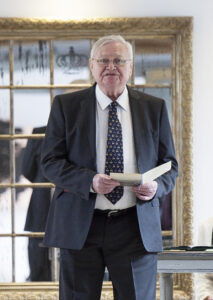 Anthony or “Tony” Stephens, as he was called, was a distinguished scholar of German literature and philosophy and a decorated expert on the poet Rainer Maria Rilke and the playwright Heinrich von Kleist. He belonged to a rare breed of Australian-born academics who was as well known in German-speaking academic circles as he was at home.
Anthony or “Tony” Stephens, as he was called, was a distinguished scholar of German literature and philosophy and a decorated expert on the poet Rainer Maria Rilke and the playwright Heinrich von Kleist. He belonged to a rare breed of Australian-born academics who was as well known in German-speaking academic circles as he was at home.
I first encountered Tony in the late seventies towards the end of my Bachelor of Arts degree at the University of Adelaide. Like others in my cohort, I was immediately captivated by Tony. He had a faultless command of German and a fierce intellect. Yet, he was also personable and humorous and liked the company of students. He made no bones about his love of good food and wine. He was barely forty but already had close personal and professional connections to Germany. He seemingly offered his students something few others could: glimpses of an immensely alluring intellectual world in Europe, a world that Tony’s Australian students felt they could vicariously tap into. Thus, with an ever-expanding coterie of honours and research students, Tony became a forceful mediator of literary traditions in the German-speaking worlds, an interpreter of new works and advocate of some of the latest theories in poststructuralist interpretation. For me, he was a dynamic and formative force in my education, a formidable role model and, later, a loyal mentor throughout the course of my career.
Tony Stephens was born in Haberfield, Sydney, in 1941. He attended the selective high school Fort Street, a highly competitive school with a long tradition of providing education for gifted children. He topped his class regularly, excelling in Latin, French and German and won prizes often for his rather whimsical creative fiction. He now counts among the few “Distinguished Fortians” of the school. He went on to study Latin, French, Italian, English and German at the University of Sydney, taking out first class honours in German in 1962. After a year studying in Munich, Tony enrolled in a PhD with Lawrence Ryan, an expert on the poet Friedrich Hölderlin. Writing on the modernist poet Rainer Maria Rilke, Tony was in capable hands with Ryan who later went on to lecture in German at the University of Massachusetts, Amhurst, US.
Tony completed his dissertation on Rilke’s poetry in 1968. His topic was not entirely of his own choosing. It was one, however, that stood him in remarkably good stead professionally. It must not have felt so at the time and Tony made a point of advising his students to choose a topic they were passionate about rather than one our supervisor was interested in. It was good advice and when the time came I chose to write on some remarkable works of feminist fantasy from East Germany, a choice Tony supported.
In 1966, only four years out from graduating, Tony moved into a teaching and research position at the University of Sydney where he was made permanent a few years later. In 1969 he spent another research year in Germany at universities in Berlin and Erlangen-Nuremberg where he made invaluable academic contacts who were to be formative influences. In 1972 he was promoted to Senior Lecturer and in 1973 he took up the position of Reader in German at the University of Adelaide.
For all his academic seriousness, Tony had an irreverent sense of humour and an irrepressible penchant for satire—not merely for reading it but for writing it as well. This was something we caught glimpses of as students when he would write satirical takes on staff meetings and pen wicked poems to air his frustrations–but satire and creative writing were soon to become more constant pursuits. In 2006 he wrote a satirical curriculum vitae for himself to accompany the publication of a piece of creative satirical writing. In this tongue-in-cheek bio he writes: “Succumbing in his youth to the illusion that Gothic novels had been written by the Goths, he [Tony] wasted an inordinate amount of time studying Germanic Philology until he achieved illumination by reading the works of H.P. Lovecraft.”
Of course, Tony’s time spent studying Rilke was anything but wasted. His astonishing scholarly output on the poet—well over a thousand pages in German devoted to him, according to Tony’s own accounting—came to the attention of the eminent Rilke scholar at the University of Erlangen-Nuremberg, Ulrich Fülleborn, who adopted Tony like a son. Under Fülleborn’s mentorship Tony quickly became known for his incisive interpretations of Rilke which included readings of the poet’s most enigmatic works such as the Duino Elegies and the Poems to the Night. Tony was intrigued by the multiple voices in Rilke’s poetry and distinguished between the initial pretext for the poem and the final “avowal” it leads to. He resisted the attempt, as was still common at the time, to reduce the poem’s lyrical vision to a biographical statement. As Tony later commented, Rilke scholarship was a “bearpit” and asserting oneself was no mean feat, especially for an outsider from Australia.
But assert himself in the “bearpit” of German Rilke studies Tony did, and he did so in ferocious style. In later life when Tony returned to his first love of Rilke he tackled the enormous challenge of translating into English the Fourth Elegy of the Duino Elegies, regarded as Rilke’s technically most accomplished work. But if Tony was daunted by his growing reputation in that bearpit he never let on. He mixed effortlessly with many of the rising stars of literature around the world and was feted by many eminent figures in German literary studies. The aforementioned meeting with Fülleborn in 1969 was particularly fortuitous in this respect, and soon after Tony travelled frequently to Munich and Erlangen-Nuremberg for sabbaticals and conferences. Tony reciprocated the invitations of his scholarly friends, luring many of them to Australia. Thanks to Tony, we students of German at Adelaide were fortunate to experience many of Germany’s sharpest minds firsthand. At a comparatively young age Tony had seemingly achieved the impossible: considerable recognition not only in Australia but in Germany as well.
Tony soon branched out into other areas of German literature, taking inspiration from mentors abroad such as the generous and charismatic scholar Gerhard Neumann, based in Freiburg and later in Munich. From around 1980 Tony moved more and more into a new bearpit that was the scholarship devoted to the troubled child of German Enlightenment Heinrich von Kleist. Kleist had hitherto been regarded as inferior to the great writers of the Enlightenment and Romantic period, Goethe, Schiller and Novalis. This was all to change with the studies of Walter Müller-Seidel, one of the founding fathers of modern Kleist scholarship and the first President of the newly constituted Heinrich-von-Kleist Society in 1960.
It was perhaps no surprise that Tony found himself drawn to the numerous controversies that abounded around Kleist’s life and work. His PhD supervisor, Ryan, had written on Kleist as had Tony’s most important intellectual mentor, the German-born Germanist Richard Samuel. Samuel was a Novalis scholar of Jewish heritage who fled from the Nazis in 1933, writing his second doctorate on Kleist at Cambridge before emigrating to Australia in 1947 where he took up a post at the University of Melbourne. Tony was so fond of him that he named his second child Samuel and dedicated his first Kleist monograph to the “memory of Richard Samuel, in gratitude for the many long conversations about Kleist.”
In Kleist studies Tony continued to make his inimitable mark. In 1984, Müller-Seidel, who was co-editor of the premier journal Das Jahrbuch der Schillergesellschaft, was keen to publish one of Tony’s first essays on Kleist, a study of the novella Michael Kohlhaas. Tony published in the yearbook repeatedly with a further essay in 1985 and 1992. Soon, the editors of the Kleist-Jahrbuch began to publish Tony’s essays—all in German of course—in 1989/90.
For most Australian scholars publishing in these journals once would be a rare honour, for Tony it became a regular occurrence. He went on to publish a total of four essays under successive editors of the Kleist-Jahrbuch. From 1994 onward two of these essays were joint publications with his postdoctoral research fellow and Kleist-scholar in her own right (and soon to become wife), Yixu Lu.
Tony’s research output in the 70s and 80s was impressive by any standards and in 1980 he was promoted to a personal chair at the University of Adelaide. In 1977 in further recognition of his outstanding scholarship Tony spent a year of research leave in Erlangen courtesy of the Alexander von Humboldt Foundation. In 1978, on the strength of a monograph written in German on Rilke’s famous novel Malte Laurids Brigge and two books on Rilke’s poetry cycle Poems to Night (one in German), among other essays, Tony was made a fellow of the Australian Academy of Humanities, serving a period as Vice-President of the Academy in 1984-85.
Throughout the 1980s Tony consolidated his position internationally as a persuasive new voice in Rilke and Kleist scholarship, and one of the leading new scholars of Kleist who brought a postmodern sensibility to his interpretations. This is attested to by guest professorships at the University of Freiburg, im Breisgau, in 1981, in Dresden in 1994, and in Cologne in 1999-2000. Further testimony to his standing in the profession is his inclusion in a number of the publications released to mark the 200th anniversary of Kleist’s death. Among these was one he co-edited entitled Wissensfiguren im Werk Heinrich von Kleist (Rombach 2012), which grew out of a Humboldt-funded conference he co-organised with Yixu Lu at the University of Sydney in 2011.
While still at Adelaide Tony continued to diversify his research projects, adding other topics and new novelists to his portfolio. Tony would return from Germany, inspired by the latest works of feminist writers such as Christa Wolf, rebel communists such as Wolf Biermann or by the latest studies on the controversial philosopher mis-appropriated by the Nazis Friedrich Nietzsche.
In 1992 Tony was awarded the prestigious Research Prize of the Alexander von Humboldt Foundation, which supported a year-long research stay in Germany. In the same year he secured an Australian Research Council major grant for a project on Kleist. In 1994 Tony published the results of the ARC grant in a monograph in English on Kleist. In 1994 he was awarded a follow-up grant by the ARC for the years 1994-1996.
By 1994, Tony had relocated to the University of Melbourne to take up the recently created position of Head of School of the new School of Languages, where he played a pivotal role at a critical time in the young school’s history. Tony oversaw the renewal of many disciplines, including German Studies after the retirement of Novalis scholar Professor Gerhard Schulz and the death of Professor Marion Adams. He was also instrumental in the recruitment of a Foundation Professor in Indonesian Studies, Arief Budiman. Over the following few years at Melbourne, Tony published a collection of essays around the theme of language and violence, Kleist: Sprache und Gewalt (1999), for which his old mentor Walter Müller-Seidel wrote a preface. In 1997/98 Tony was made Chair of the Language Studies Committee of the Australian Academy of the Humanities and Chair of the Victorian Universities Languages Consortium.
In the middle of 2000 Tony returned to his alma mater at the University of Sydney, becoming Head, School of European, Asian and Middle Eastern Languages and Studies and McCaughey Professor of Germanic Studies. In the cheeky parody of a short autobiographical sketch mentioned above, Tony described this move back to his roots in by now typical tongue-in-cheek fashion: “Fleeing to Sydney to escape a purge of humorists, he became a burden on the budget of the University of Sydney until he retired in 2004 to enable his salary to be used to replace a sandstone gargoyle, called Alan: a fair exchange.”
In 2001 though Tony was far from ready to retire, and he gave the fifth Triebel lecture of the Academy. He chose a topic which deftly displayed the breadth of his interests and his ability to straddle high and ‘low’ cultural forms: “From de Sade to Stephen King: The literary aesthetics of evil,” available on the Academy website as a download. In 2002 Tony was made a member of the Bavarian Academy of Sciences, another rare accolade for an Australian scholar. In 2003 he was awarded a Centenary of Federation of Australia Medal in recognition of his contribution to Australian society.
In 2004, he retired from full-time employment but continued to publish on a host of old and new topics: writers such as Friedrich Nietzsche, Cornelius Castoriadis and Martin Heidegger. In his retirement he devoted more time to creative writing. In Adelaide he had written a radio play about the mythical figure of Ariadne that was produced by ABC FM in 1985, and in 2007 he wrote a piece called Absences. In 2012 Tony returned to his love of Rilke upon the request of the Real Maestranza de Caballería de Ronda, a cultural institute in Ronda, which commissioned a special edition of Spanish translations of the letters and poems Rilke wrote in Ronda and an essay by Tony to mark the centenary of Rilke’s visit to the spectacular ancient city in the mountains of Andalusia. Tony created new translations of some of the poems, including the Sixth Duino Elegy. Ronda and Rilke were also the topic of an ABC radio feature documentary inspired by Tony’s research that was produced by Tony’s former PhD student, Tom Morton (who also co-translated “The Spanish Trilogy,” “The Sixth Elegy” and “The Raising of Lazarus”).
With his extraordinary track record of scholarly work in both English and German Tony Stephens has left an enduring impact on his former students and the international scholarship on Rilke and Kleist. He passed away peacefully on 19th December 2023. He is survived by his three children, Bronwen and Samuel from his marriage to Hilary Stephens, and Peter from his wife Yixu Lu.
Emeritus Professor Alison Lewis FAHA
The University of Melbourne



